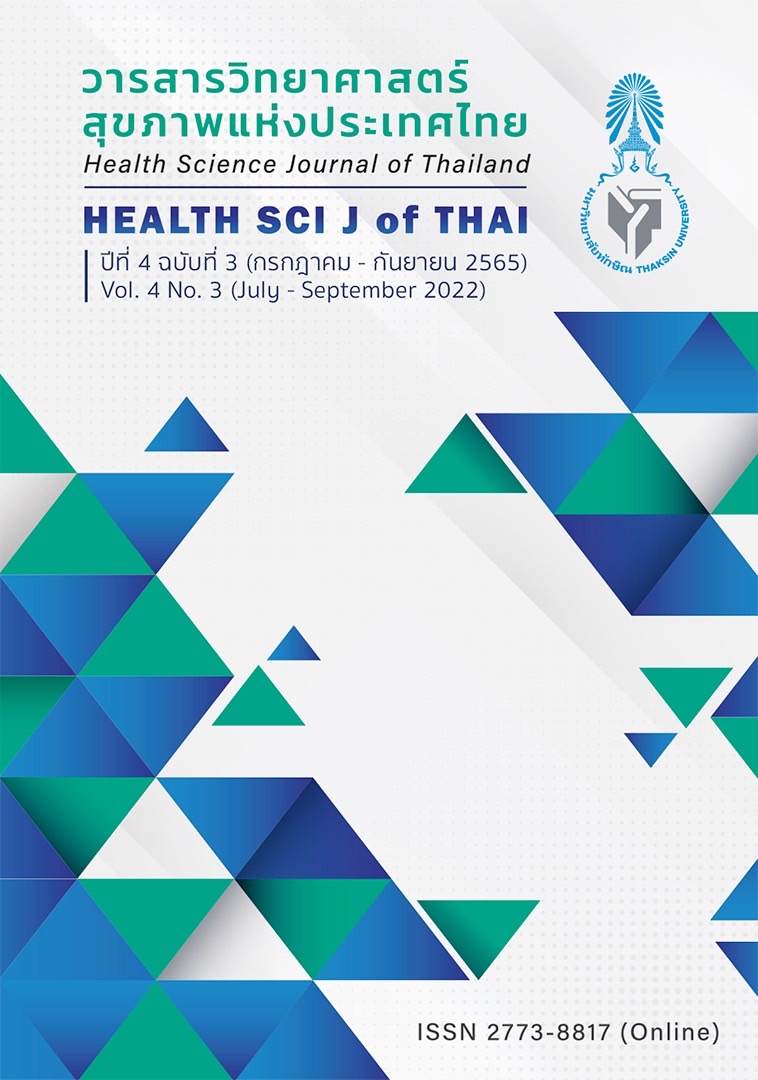Effects of Health Literacy Promoting Program on Particulate Matters for Secondary School Students Applying Phenomenon-based Learning with Blended Learning
Main Article Content
Abstract
The purpose of this research was to study the effects of a health literacy promoting program on particulate matters for secondary school students. The samples were 60 secondary schools with health literacy about particulate matters at a low level. Divided into two groups with 30 students in the experiment group that received the health literacy promoting program on particulate matters for 8 weeks, 2 days per week, 1 hour per day and 30 students in the control group not received the health literacy promoting program. Instruments used were the health literacy promotion program about particulate matters. Data were collected by the health literacy about particulate matters questionnaire. Statistics used to analyze data were descriptive statistics; means, frequency, standard deviation, analytical statistics; paired sample t-test and independent sample t-test at the statistical significance (p < 0.001). After the experiment, it was found that the mean score of health literacy about particulate matters of the experimental group was significantly higher than the control group (p < 0.001). This research indicated that the intervention increased health literacy about particulate matters of secondary school students.
Article Details

This work is licensed under a Creative Commons Attribution-NonCommercial-NoDerivatives 4.0 International License.
References
Greenpeace Thailand. World Air Quality Situation Report (2018): Global city and region PM2.5 ranking. [Internet]. 2018 [Cited in 4 June, 2019]. Available from: https://www.greenpeace.or.th/s/right-to-clean-air/2018-world-air-quality-report.pdf.
Pollution Control Department. Pollution issues in Thailand 2019. Bangkok: Mongkhon Printing.; 2019. (In Thai)
Bureau of Epidemiology, Department of Disease Control. Surveillance situation of health effects from Air pollution, dust smaller than 2.5 microns in Bangkok and perimeter and risk area Between January 2019 - 18 January 2020. [Internet]. 2018 [Cited in 24 February, 2020]. Available from: https://th.city/mj0W3.
Nutbeam D. Defining, measuring and improving health literacy. [Internet]. 2015 [Cited in 25 April, 2019]. Available from: https://www.who.int/global-coordination-mechanism/news/Health-literacy-WHO-Geneva-Nov-2015.pdf.
Department of health, Ministry of Public Health. (2017). Operating Health literacy and Health communication. [Internet]. 2017 [Cited in 26 April, 2019]. Available from: http://doh.hpc.go.th/data/HL/HL_DOH_drive.pdf
Health Education Division. (2018). Establishing and assessing health literacy and health behavior. [Internet]. 2018 [Cited in 25 February, 2019]. Available from: http://www.hed.go.th/linkhed/file/575
Intarakamhang U. Health literacy: Measurement and development. Behavioral Science Research Institute. Bangkok: Sukhumvit Printing.; 2017. (In Thai)
Silander P. Phenomenon Based Learning. [Internet]. 2015 [Cited in 16 August, 2020]. Available from: http://www.phenomenoleducation.info/phenomenon-based-learning.html.
Graham RC. Introduction to blended learning. [Internet]. 2012 [Cited in 16 August, 2020]. Available from: http://www.publicationshare.com/graham_intro.pdf.
Rootman I, Gordon EB. A vision for a health literate Canada report of the expert panel on health literacy. Canadian Pubic Health Association.; 2008.
Symeonidis V, Schwarz JF. Phenomenon-Based Teaching and Learning through the Pedagogical Lenses of Phenomenology: The Recent Curriculum Reform in Finland. Forum Oswiatowe.; 2016.
Daehler K, Folsom J. Making Sense of SCIENCE: Phenomena-Based Learning. [Internet]. 2016 [Cited in 22 August, 2020]. Available from: http://www.WestEd.org/mss.
Horn BM, Staker H. The Rise of K-12 Blended Learning. Innosight Institute.; 2011.
Tinnangwattana C. The effect of Blended learning lesson plans in foods and nutrient title on science for mathayomsuksa 2 Mathayomwatsing school. Srinakharintarawirot Academic Journal of Education 2012; 13(2): 89-96.
Prompukdee S, Boonchuaythanasit K, Kainakha P. Effectiveness of Health Education Program using Participatory Learning Process for Health Literacy Development on Physical Violent Prevention of Secondary School Students of Saraburi Primary Educational Service Area Office 2. Kasetsart Educational Review2017; 32(2): 144-150.
Thanthong S. Theory and Learninginthe Digital Age:Connectivism and Hybrid or Blended Learning. Suan Sunandha Academic & Research Review 2020; 14(1): 75-88. (In Thai)
Phetkong C. Effects of health literacy promoting program with social media used on obesity prevention behavior among overweight mattayomsuksa 2 students. Journal of Health Education 2019; 42(2): 23-32. (In Thai)
Singtong T, Ivanovitch K, Boonshuyar C. Effects of a Nutrition Literacy Promotion Program on Eating Behavior of Secondary School Students. Thai Journal of Public Health 2020; 50(2): 148-160. (In Thai)
Kaewpipob N. Effects of health literacy and self-efficacy developing program for promote pregnancy prevention behavior. Journal of Health Education 2019; 42(1): 55-67. (In Thai)
Anee C, Boonchuaythanasit K, Kainakha P. Effectiveness of Health Education Program on Health Literacy Development by Questioning Method for Sexual Relations Prevention Behaviors among junior High school Students, Nonthaburi Province. Kasetsart Educational Review 2017; 32(2): 137-143. (In Thai)


